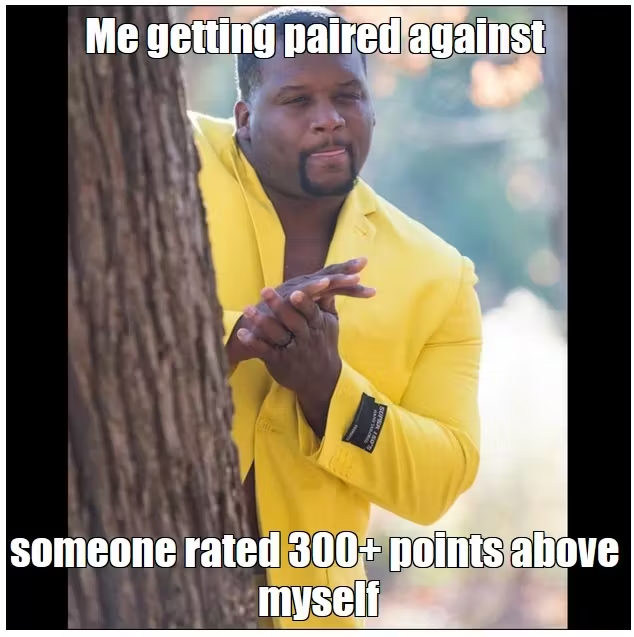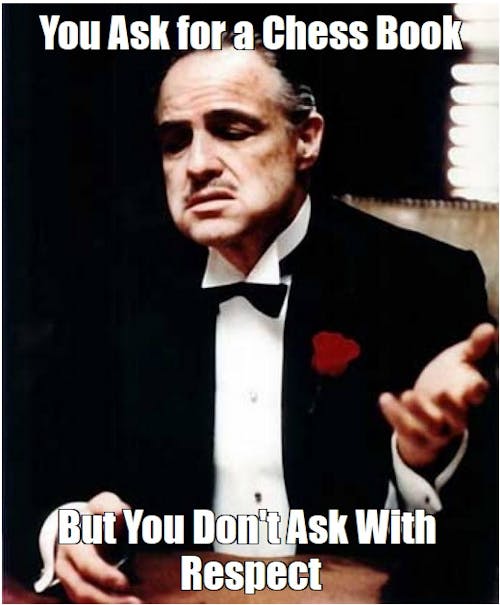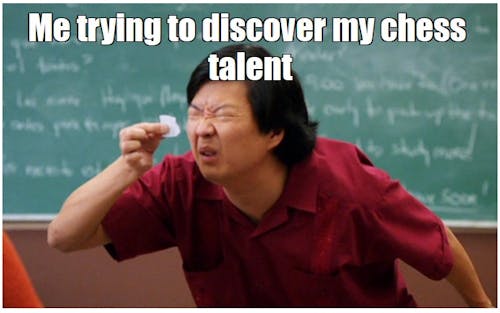Are you sure you want to delete your account?
(This will permanently delete all of your data - purchases, game scores, ratings, etc)
Change your username
Your current username is: guest
Change your account email address
Your current account email is:
Redeem your Fampay code here!
Use your Fampay code to get access to the Play Magnus Plus Membership!

Why do Stronger Players Make Mistakes Against Weaker Players?
One IM friend of mine, rated about 2400, told me fondly a few times a story how he first “held his own” against a 2650-rated GM, then got an “almost winning position” only to lose it in the end. The implied meaning of his glorious tale is that his true strength should be close to 2650. Typically, such a psychological mistake is typical of club players. You hear similar complaints all the time: “I have totally outplayed him, but…”. There is always this “but”! So, what’s wrong with this attitude? And why do we see so many rollercoaster games between Davids and Goliaths?
First of all, a lot depends on the strength of the opponents. For example, in a 1700 vs. 2000 match-up, both players are relatively weak by chess engines’ standards, so the computer is likely to find many mistakes for both sides. The one who makes the last blunder loses.
In a nutshell, humans are terrible at chess by computer standards. If you revisit the books written in the pre-engine era, you will realize that many games there have this narrative of one player consistently outplaying the other, flawlessly executing his master plan. However, if you check the masterpiece with a modern engine, you will often realize that the opponent had chances to escape or even turn the tables with a brilliant tactical strike unacknowledged by the players and the commentators.
Secondly, the stronger players often underestimate their opponents, which results in such undesired scenarios as playing superficially and waiting for the game to win itself; attacking too vigorously and recklessly in a position that doesn’t allow it because “it’s time to show the patzer who the boss is”.
One experienced GM coach told me that the best way to play against candidate masters and below is to put your pieces on nice central squares, after which either the opponent’s position will fall apart by itself, or he will self-destruct. This recommendation is useful to some extent. You can often see experienced GMs not trying too hard against their amateur opponents. They quickly play the moves that are supposed to be “good enough”, and the amateur becomes excited, starts sweating, gets into time trouble, and blunders something silly. However, sometimes the rating favorites play too sloppily and get punished. There is a thin line between playing practically and quickly and making second-rate moves because you believe you can get away with them.
Thirdly, the rating difference makes the favorites take more risks to avoid drawing the game; many of them overpress and end up losing.
Fourthly, there are fluctuations in form, especially among non-professional players. On a given day, a 2200 might play at a 2400 level, while his 2400-rated opponent might perform at 2200 level, basically reversing the roles in the match-up.
Fifthly, nowadays, when you see the pairings, it is often not even exactly clear who the favorite is. I have briefly touched upon this topic in the post about rating inflation in chess.
The ratings of some players haven’t scaled up yet due to them not having played an adequate number of rated games. For example, 16-year-old GM Rameshbabu Praggnanadhaa, one of the most talented chess prodigies in the world right now and the finalist of the recent Chessable Masters event, has an official FIDE rapid rating of…what do you think it is?
2700? 2500? What if I tell you the answer is 1927?
Oh, how I pity the chess players who will face him in official rapid tournaments!
What is harder: to beat Pragg or to spell his name right?
To summarize, it is essential to avoid the typical reaction of amateur players after such a loss. For them, the story goes: “At first the position was rather balanced, then complications started. At a certain point I was winning, but he GOT LUCKY, so I ended up losing”. The real story is that, as they say in Russia, “class has prevailed”, meaning that no matter how messy the game itself was, in the end, the more experienced player had the final say.
So, the weaker players should focus on their own mistakes in such a case and try to make sure they don’t happen again rather than ridicule the weak play of the higher-rated opponents.
Similarly, Goliaths who suffer a loss at the hands of Davids should also carefully analyze what went wrong and adjust their approach accordingly.
It is impossible to completely eliminate mistakes from your chess game. What you can do, however, is take it to a new level by utilizing Magnus Trainer – a one-stop solution aimed to help you become a proficient chess player. Don’t miss your chance to study under the guidance of the reigning World Chess Champion!

